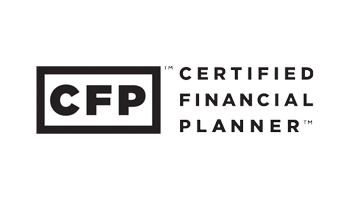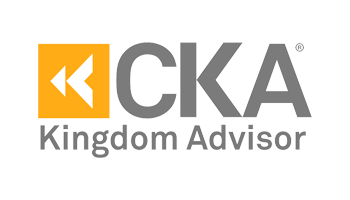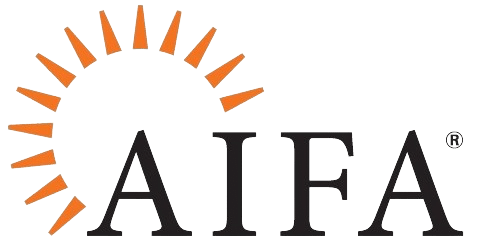Affiliations

Certified Financial Planner (CFP®)
The CERTIFIED FINANCIAL PLANNER™, CFP® and federally registered CFP (with flame design) marks (collectively, the “CFP® marks”) are professional certification marks granted independently in the United States by Certified Financial Planner Board of Standards, Inc. (“CFP Board”).
The CFP® certification is a voluntary certification; no federal or state law or regulation requires financial planners to hold CFP® certification. It is recognized in the United States and a number of other countries for its (1) high standard of professional education; (2) stringent code of conduct and standards of practice; and (3) ethical requirements that govern professional engagements with Clients.
To attain the right to use the CFP® marks, an individual must submit an application and satisfactorily fulfill the following requirements:
- Education – Complete an advanced college-level course of study addressing the financial planning subject areas that CFP Board’s studies have determined as necessary for the competent and professional delivery of financial planning services, or attain a bachelor’s degree from a regionally accredited United States college or university (or its equivalent from a foreign university). CFP Board’s financial planning subject areas include insurance planning and risk management, employee benefits planning, investment planning, income tax planning, retirement planning, and estate planning;
- Examination – Pass the comprehensive CFP® Certification Examination. The examination, administered in 10 hours over a two-day period, includes case studies and Client scenarios designed to test one’s ability to correctly diagnose financial planning issues and apply one’s knowledge of financial planning to real world circumstances;
- Experience – Complete at least three years of full-time financial planning- related experience (or the equivalent, measured as 2,000 hours per year); and
- Ethics – Agree to be bound by CFP Board’s Standards of Professional Conduct, a set of documents outlining the ethical and practice standards for CFP® professionals.
Individuals who become certified must complete the following ongoing education and ethics requirements in order to maintain the right to continue to use the CFP® marks:
- Continuing Education – Complete 30 hours of continuing education hours every two years, including two hours on the Code of Ethics and other parts of the Standards of Professional Conduct, to maintain competence and keep up with developments in the financial planning field; and
- Ethics – Renew an agreement to be bound by the Standards of Professional Conduct.
The Standards prominently require that CFP® professionals provide financial planning services at a fiduciary standard of care. This means CFP® professionals must provide financial planning services in the best interests of their Clients.
CFP® professionals who fail to comply with the above standards and requirements may be subject to CFP Board’s enforcement process, which could result in suspension or permanent revocation of their CFP® certification.

Certified Kingdom Advisor (CKA®)
Certified Kingdom Advisor® (CKA®) is a designation granted independently by Kingdom Advisors to individuals who have demonstrated themselves to be:
Able to Apply Biblical Wisdom in Counsel:
By participating in the Certified Kingdom Advisor coursework and examination and committing to incorporate biblical principles in their financial advice.
Technically Competent:
By providing evidence of an approved professional designation (varying by discipline) or by having at least 10 years full-time experience in their discipline.
Ethical:
By agreeing to espouse and practice the Kingdom Advisors Code of Ethics, by maintaining active local church involvement, and by providing pastoral and client letters of reference.
Biblical Stewards:
By pledging that they practice biblical stewardship in their personal and professional lives and by giving regularly in proportion to their income.
The CKA® certification is a voluntary certification. Candidates must apply for the designation and complete a rigorous Core Training program, including a final certification exam.
Individuals who become certified must meet ongoing continuing education requirements, membership in Kingdom Advisors, and compliance with a set of ethical principles, rules, and standards in order to continue to use CKA® designation.

Accredited Investment Fiduciary Analyst
Accredited Investment Fiduciary Analyst™ designees are the few people in the country with knowledge of both a prudent investment process and assessment principles, qualifications that are becoming increasingly desired and demanded by both the industry and regulators.
What makes an AIFA® designee different from other advisors?
Only those who have earned the AIFA® Designation are formally recognized by the Center for Fiduciary Studies for demonstrating a full understanding of how to implement those processes to help individuals and families pursue their investment goals in a responsible and accountable manner. AIFA@ Designees are committed to using the knowledge and resources they have gained through their training to:
• Employ uniform, industry-recognized processes for developing a personalized investment strategy based solely on your specific investment needs
• Apply objective, comprehensive standards for evaluating and recommending investment options for your portfolio
• Monitor and report performance of your portfolio and its underlying investments on an ongoing basis and recommending changes when necessary
• Conduct ongoing reviews of his or her business practices to ensure fiduciary principles are being properly applied

Certified Investment Management Analyst
Certified Investment Management Analyst® certification is the peak international, technical portfolio construction program for investment consultants, analysts, financial advisors, and wealth management professionals. CIMA® certification teaches professionals how to integrate a complex body of investment knowledge, ethically contributing to prudent investment decisions by providing objective advice and guidance to individual and institutional investors.

Certified Exit Planning Advisor
What is CEPA®
Formally, CEPA@ is an acronym for Certified Exit Planning Advisor. Participants who successfully complete the executive MBA style program, and pass the closed book proctored exam, receive the Certified Exit Planning Advisor (CEPA®) credential.
In reality, A CEPA® is a holistic business advisor that helps a business owner align their business, personal and financial goals while building transferable value into their company so that the owner is always prepared to capitalize on a transition of their company, planned or unplanned.
Stewardship Trust Advisors is a proud member of the Byron Center Chamber of Commerce
